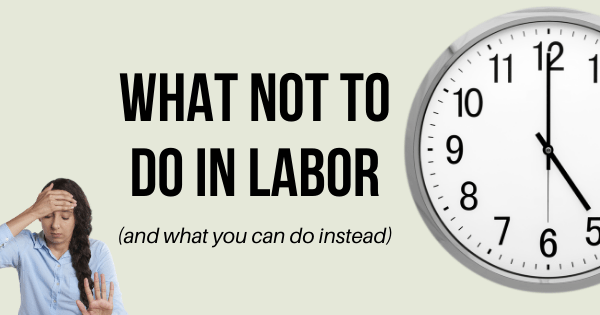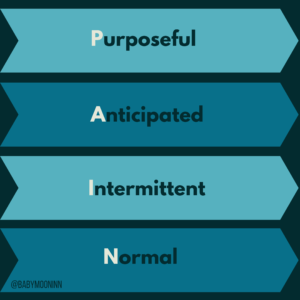
Dear Pregnant People, You Can Get Through This
Dear Pregnant People, You Can Get Through This
The following is a guest blog written by Natalie Vitez, who is currently expecting her first child

Natalie Vitez is currently expecting her first child and planning to give birth at at freestanding birth center.
I was ecstatic when my husband and I
found out I was pregnant.
I’d suffered a devastating miscarriage last year, and finding out we were expecting our rainbow baby inspired much joy for us and our family. I knew without a doubt that I wanted to give birth at Babymoon Inn, a birth center in Central Phoenix. Not only had they provided me excellent care as a client leading up to this pregnancy, but they had become like a second family to me since I began working there as a doula. I had every confidence in their ability to guide me through a healthy pregnancy and birth. I had so much to look forward to: maternity clothes, baby showers, preparing the nursery, and endless baby kicks. Luckily, this pregnancy has been completely normal, and I’ve been able to do all of the daydreaming while soaking in the excitement that everyone was feeling.
And then the world turned upside down.
The Coronavirus, or COVID-19, is spreading around the world and everything has changed. The social distancing mandated to keep it from overwhelming our healthcare system has drastically affected everyone’s daily lives.
Research is limited on the effects of the virus on pregnant people and their babies, so the best option is to be extremely cautious and stay home. Now that I’m working exclusively from home as an administrative assistant, I have to be careful with how much toilet paper I use during my frequent bathroom visits because toilet paper is scarce.
Let me repeat that to highlight the absurdity: toilet paper is scarce.
The unknown is scary. What you’re feeling – whatever it is – is valid. You are allowed to be scared. You are allowed to be unsure. You can feel disappointed that your baby shower was cancelled. You can feel alone even with your phone ringing off the hook and text messages flooding in. All of these thoughts and feelings are okay. I’m right there with you. There are so many that are right there with you too.
You are not alone. We’re in this together.
My greatest hope for you is that you won’t let those negative feelings take over. If everything feels out of control, look for what you can control. We all know the health recommendations of washing our hands frequently, social distancing, and avoiding touching your face.
But here are a few things you can do to help keep your sanity and
have the best pregnancy and birth possible:
Re-evaluate your birth plan:
Take the time to evaluate what is truly important to you and plan how to accommodate and adjust for any restrictions of your birthing place. Consider your options for where to give birth, which may include home, the hospital, or a freestanding birth center.
Get creative:
Have a virtual baby shower or mother blessing. Use Zoom or Facetime to have your doula or family “present” at your birth. Join that virtual support group for pregnant people. When we let go of one idea or preconceived notion, it opens the door to so many new and creative ideas.
Hire a birth doula:
Even if the doula can only provide virtual support on the big day, they can help prepare you and empower you beforehand as well as give excellent support postpartum.
Talk to your provider:
Either during in-person visits or over the phone, take the time to really talk about how you’re doing and prioritize your pregnancy.
Talk to other pregnant people:
No one is going to understand what you’re going through more than another pregnant person.
Take a childbirth class:
Learning everything you can about childbirth and what your options are can provide a more satisfying birth experience. Now more than ever, it’s important to be informed and prepared heading into your birth.
Read positive birth stories:
Surround yourself with positive and uplifting stories to remind yourself what is waiting for you at the end of this. Include recent positive stories of people who have given birth too!
Move your body:
Moving is not only good for you physically, but it also does wonders for the mind and reduces stress.
Keep a journal:
If it’s something that is up your alley, write everything down. Not only can it help clear your head, but it’ll be fun to show your child what crazy things were happening when they were born.
Above all else, find the light. You can still feel exhilaration when the baby kicks. Or still delight in unpacking new baby onesies, even if they had to come in an online order. Or still laugh at all of the funny pregnancy posts online and the social distancing memes. New babies still represent, as they always have, our most precious hopes for the future.
I hope that you still feel the magic this baby brings and have big dreams. This crisis will not last forever. Don’t let it steal your joy. Please reach out if you need support and remember that you are not alone. Your provider, your doula, your friends and family, they are all here for you.
I am here for you.
You can get through this.



 “It’s not my first rodeo.”
“It’s not my first rodeo.”

 DON’T watch the clock.
DON’T watch the clock. 



